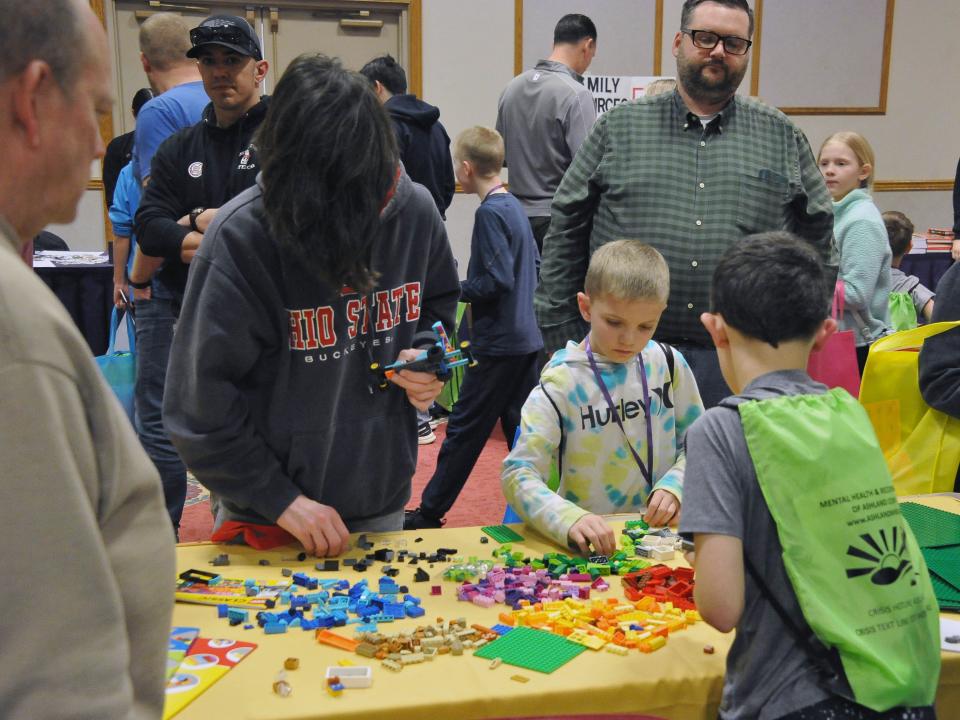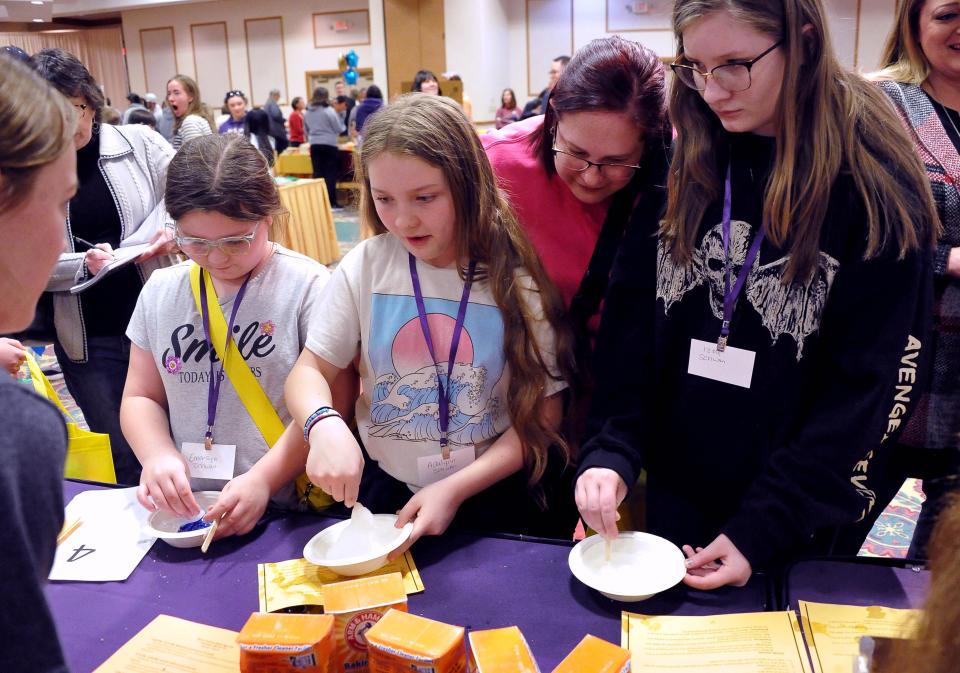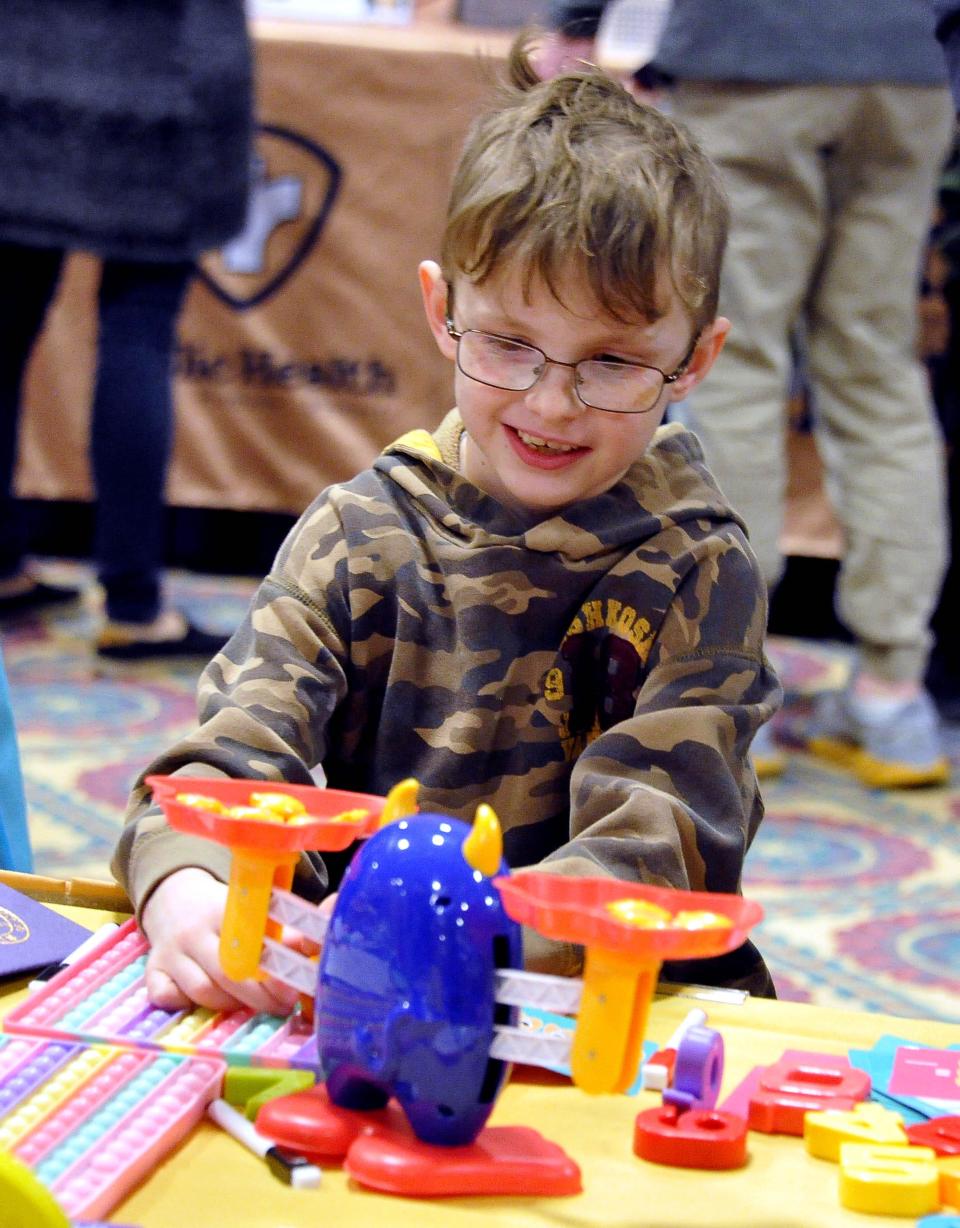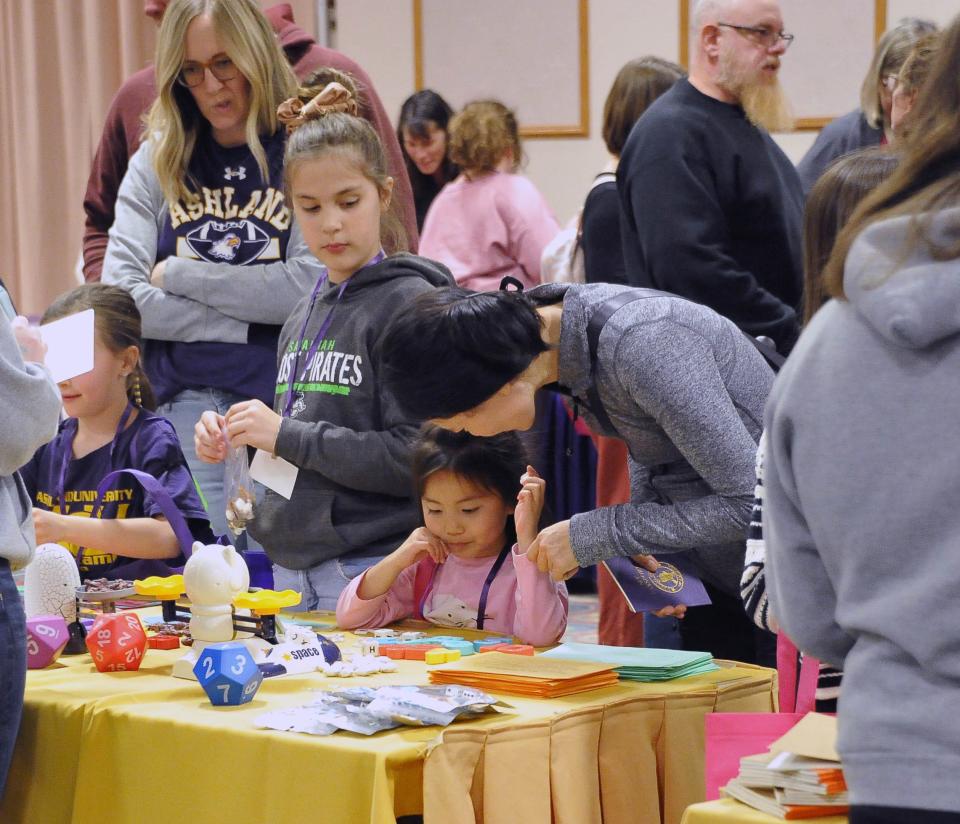To stem slide and rebuild math skills, Ashland U brings out the fun side of arithmetic
The atmosphere was more carnival than academic, based on enthusiasm and participation at Family Math Night at Ashland University, where the combination of entertainment and learning attracted a crowd.
Families were treated to a burrito and ice cream bars, games and activities, take-home items from books to coding beads, and prizes.
The evening was designed to bring awareness to the slide in math scores among students in multiple school districts as a result of the pandemic and the funding effort to counteract it.
Elementary school and older students from eight districts in Northeast Ohio were invited to attend. The event drew 200-250 students along with family members and educators, bringing the total to about 400.
"In the wake of the unprecedented challenges posed by the COVID-19 pandemic, the decline in math scores among students in Ohio has raised understandable concerns among parents, educators and policymakers alike," said Erik Kormos, assistant professor of educational and assistive technologies, in his introductory message Tuesday evening to the crowd at John C. Myers Convocation Center.

Students teachers helping stem math slide at area schools
In an effort to stem the tide and rebuild math skills among all ages of students, but primarily elementary, the Ohio Department of Education provided Statewide Mathematics and Literacy Tutoring grant money to universities for assistance in the endeavor.
Using the grant funding, which also paid for Family Math Night, Ashland University has deployed 30 student tutors in school districts in Richland, Ashland, Wayne, Cuyahoga and Lorain counties, Kormos said.
"It's a statewide issue," he said. "Schools weren't singled out."
However, he said in a previous email, Ashland, Crestview and Mapleton districts were listed as having "high needs." Tutors also have been placed in Northwestern Local Schools.
"... Our program has made significant strides in bolstering math proficiency among our students. In fact, in the districts where our tutors have been actively engaged we've seen an impressive rise in scores by nearly 14%," he said.

The Ashland University Eagle Tutors program started in the fall of 2022, Kormos said.
The grant compensates student tutors at $20 per hour and gives them a gas stipend. There is a provision for at least five scholarships and schools are given $5,000 for resources as part of the grant.
Schools set the tone for how tutoring is handled
The tutors may be used in any way teachers in the school district they serve determine is best for students, from small groups to large groups or individual instruction.
They may use a separate room, the back of a classroom or even a hallway, Kormos said.
Not only are the students they tutor gaining skills, the university students are "figuring out what education looks like in different settings and environments," he said.
Ashland students benefit from the opportunity to work in suburban, urban and rural districts.

As a result of the program, several of the tutors have been offered substitute teaching positions and one, even a full-time job following graduation, Kormos said.
Encouraging students to enjoy the math-related activity stations manned by university student tutors and laid out in a rows across the Convocation Center, speaker Lisa Vernon-Dotson, dean of the Dwight Schar College of Education at Ashland University said, "Learning can and should be fun."
In addition to her academic credentials, Vernon-Dotson said, "I am also a mom.
"I want (children) more than anything to be engaged in school and be happy while they are in the school," she said.
Each child was given a tote bag and a passport to record stations visited. Participants were entered into a raffle for prizes.
Kids get into the numbers game
Rachel Schwan brought her three daughters − students in Ashland City Schools − Izabella, eighth grade; Adalynn, fifth grade; and Emersyn, third grade, with Emrsyn being the main motivator for attendance.
Acknowledging the older two were primarily "tagalongs," Rachel Schwan said, "(Emersyn) loves math. If she doesn't have math homework, she is upset."
Taft Elementary School fourth-grade student Eva Smith came "to learn more math," she said. "I love math."
As Eva intently worked at Code Craft Creations Corner where different colors of beads were assigned to letters of the alphabet, her dad, Kenton Smith said, "Her mom signed us up. It's right up (Eva's) alley."
"(This is) to keep them having fun and learning at the same time," said Marcus Derr, who brought his first-grade son, Tristan, from Crestview.

Meredith Overholt, an Ashland University senior from Fredericktown, noted how the literacy portion of the grant fits in.
She was distributing children's fiction books about math.
Math Puzzle Palooza, Math Dome Builders
Overholt, who plans to teach second- or third-grade next year, said, "It's important reading about math. It's how kids learn best. It helps it to click better in their heads."
Stations included Math Puzzle Palooza, Math Dome Builders, Mixing Math Munchie Madness and Tech Math Checkpoint.
A few community organizations also were on hand.
Jill Hartson, director of preparedness and prevention for the Ashland County Health Department, said the department likes to be represented at events with families and children to talk about a variety of safety issues.
This year worked out especially well with the upcoming solar eclipse to combine safety with math concepts related to the eclipse.
The grant ends this semester, Kormos said, but he and his team members, Amy Crawford and Laura Kanney, are hoping to extend it.
This article originally appeared on Ashland Times Gazette: Ashland Family Math Night aims to rebuild skills in fun environment

